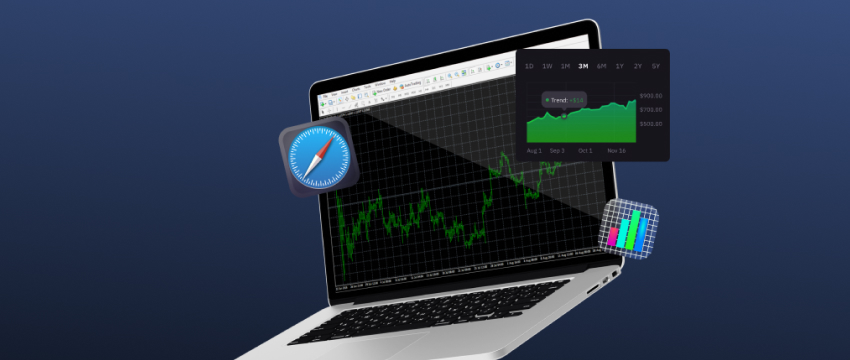Market volatility is an aspect of trading that most traders must deal with. Knowing how to deal with aggressive price movements comes with experience. These movements happen because of market volatility. Handling them depends on your risk tolerance. It also relies on your handelsstijl.
For the purposes of this blog, we’ll be exploring day trading. More specifically, we’ll be looking at what exactly a day trader is, how they operate, and the risks they face.

The fundamentals of day trading
Day trading is essentially the buying and selling of financial instruments within the same trading day. This might include currency pairs (forex), aandelen, grondstoffen, indexen, futures, metalen, and in some instances, even crypto currencies.
Day traders usually hold positions for milliseconds to hours, aiming to capitalize on short-term price movements before the trading day ends to avoid overnight risks.
Day trading is a high-stakes approach to trading. It involves a frenzied level of entering and exiting positions. The goal is to maximize potential wins on small price changes. Day trading is popular due to the potential for quick gains. However, it also comes with a high level of risk.
Common traits of day traders
There are certain commonalities between day traders – particular traits that characterise those individuals that opt for this style of trading.
- Day traders are not usually risk averse. They are comfortable with the rapid pace of day trading and can tolerate the level of risk that it imposes particularly well.
- Day traders tend to have extensive knowledge of how the market operates, including the factors that impact price movements, and the volatilities that arise as a consequence.
- Disciplined day traders follow the parameters of their trading plan, adhere to its rules, and only deviate when absolutely necessary.
- Day traders rely on stable and fast internet connectivity, advanced trading platforms, and technology to execute trades optimally and monitor the markets effectively, in real time.

Risks of day trading
As we’ve already mentioned, day traders are exposed to significant risk utilising this trading strategy.
- In the case that they opt for using leverage, they’re having to contend with amplified losses if the market moves in an adverse direction.
- The speed at which day trading takes place also leads to significant stress and even burnout. This may impact discipline, concentration and reasoning, resulting in poor trading decisions and negative outcomes.
- Considering the number of trades that day traders execute daily, this form of trading requires full-time attention and commitment. From monitoring the markets to analysing the news, day trading consumes a good chunk of one’s time, requiring constant focus and quick decision making.
- Market risk is high if the trader is trading in a session marked by high volatility and price fluctuations. Even the most experienced trader is likely to be confronted with unanticipated market movements, with insufficient time to react.
This doesn’t mean day trading offers no reward. It can be rewarding, but preparation is crucial. You need the right tools and strategies.
Informed decisions must be made at the right time. Success depends on acting in the right moment.
Strategies and tools driving trades
Day traders make use of various tools and strategies to come to trading decisions.
For one, they rely heavily on technical analysis before taking a decision. They use charts, patterns, and economic indicators, to identify potential trading opportunities.
They also consider historical data to speculate on future price movements. Secondly, they make sure to follow the news, monitoring global events and economic releases or announcements, to be able to react at the drop of a hat, to limit losses and maximise potential gains.
Third, day traders seek a handelsplatform that will be able to keep up with demands of day trading. One of the most popular is the MetaTrader 4 (MT4), utilised by day traders all across the globe. The MT4 platform is renowned for its robust features, advanced technical analysis, and algorithmic trading.
Fourth, day traders are cognizant of the risk that leverage incurs, particularly if it’s not properly handled, and will integrate risk management techniques into their trading plan to mitigate capital losses that leverage has the tendency to amplify. Examples include stop-loss orders, take-profit orders, trailing stops, etc.
Day trading strategies
There are several ways that day trading takes place, each strategy a different means for achieving one’s trading goals. The four most popular include scalping, momentum trading, reversal trading and breakout trading.
Scalping involves entering and exiting up to hundreds of positions in a single trading day. The positions are held for seconds to minutes, with traders looking to make gains from short-term price changes.
Momentum trading focuses on stocks with strong upward movement and buying them before they peter out. They are identified by checking price action, trend lines, and technical indicators like moving averages, RSI, MACD, and others.
Breakout trading seeks assets that break through preestablished support or resistance levels. Traders typically enter trades as soon as the price moves beyond these levels, speculating a sharp movement in the direction of the breakout.
Reversal trading looks to make gains on those instances when an asset’s price changes course, be this up or down. It’s a challenging strategy being that it requires precise timing and the ability to accurately identify reversals.
Figuring out whether day trading is for you
Day trading is certainly not for everyone as it requires a particular skillset, personality, emotional intelligence, and time. As for yourself, are your trading decisions driven by objective analysis or how you are feeling in a particular moment? If it’s the latter, consider working on your trading psychology before engaging in day trading that requires sound reasoning and judgement.
Do you have the time to commit to day trading? This trading style requires hours of one’s time – to plan, to analyse, to execute trades and to monitor.
If your schedule does not give you the ability to devote sufficient time to day trading, consider another strategy. Also, have you gained sufficient trading related education to be able to engage in day trading?
What type of learning have you immersed yourself in? Have you read blogs, listened to podcasts, attended webinars or seminars, watched any videos, or consulted with a global community of traders to get better insights, tips, and ideas on what day trading entails?
If the answer is no, no, and no again, start thinking of ways to consume the right type of resources to widen your scope of knowledge, skills, and expertise, before becoming a day trader.
Finally, regardless of what strategy you decide to adopt as your own, ensure risk management stays front and centre. If you neglect implementing the tools required to protect your capital, you’re likely to incur larger losses than what you’d imagined.

Become a day trader with T4Trade
T4Trade is a popular global broker with clients worldwide. The broker offers top-tier, 24/5 multilingual customer support, cutting-edge trading platforms, and flexible trading conditions. T4Trade is also a great go-to resource for traders looking to learn more about forex trading in a user-friendly way.
A variety of videos, podcasts, eBooks, webinars, and videos-on-demand are curated by in-house specialists, catering to all types of traders.
T4Trade traders can also choose from a wide range of trading instruments across 6 asset classes, and enjoy flexible leverage, competitive spreads, fast trade execution and seamless deposit and withdrawal options. Traders can also choose from multiple trading accounts that best suit their needs and individual preferences.
Disclaimer: This material is for general informational and educational purposes only and should not be considered investment advice or an investment recommendation. T4Trade is not responsible for any data provided by third parties referenced or hyperlinked in this communication.



